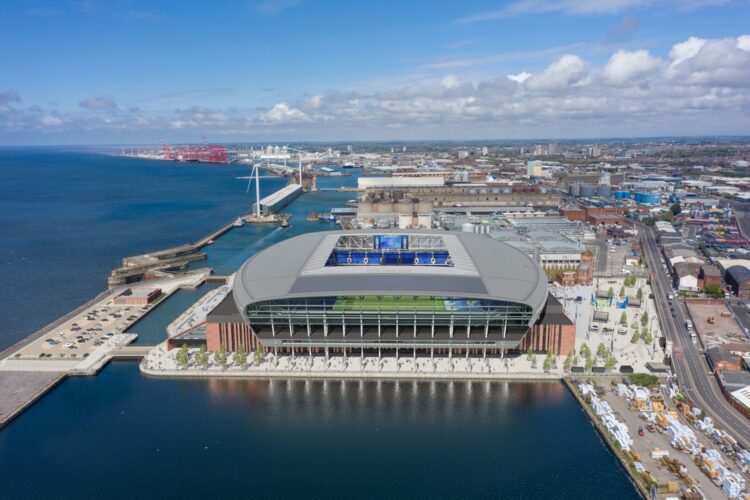Chief executive of Liverpool Chamber of Commerce Paul Cherpeau has written to Secretary of State Robert Jenrick urging him to approve Everton’s new £500m stadium. Tony McDonough reports

Liverpool Chamber of Commerce chief executive Paul Cherpeau has written to a Government minister urging him to give the go-head for Everton’s proposed new stadium and not to ‘call in’ the project.
In February, Liverpool City Council planners approved the application to build the £500m 52,888-capacity arena at Bramley Moore Dock in Liverpool Waters. Everton are hoping to start work on the three-year build this summer.
However, on Monday the Secretary of State for Housing, Communities and Local Government, Robert Jenrick, asked for more time time to consider the project. He was initially given 21 days to make a decision following the council planning approval but has now asked for an extension.
There is strong opposition to the plan from UNESCO, Heritage England and the Victorian Society. They object to the filling of the Grade II-listed Bramley Moore Dock in the city’s Northern Docklands.
In the light of those objections there are fears Mr Jenrick will ‘call in’ the scheme. This would lead to a delay of at least several months while the scheme was being considered by a planning inspector at an inquiry. The inspector would then make a recommendation to the Secretary of State.
Now Mr Cherpeau, who is the voice of 600 Liverpool city region businesses, has written to Mr Jenrick urging him to end the delays and allow the stadium to go ahead. The project, he said, represented a massive boost for the supply chain and local jobs.
It is estimated the new stadium it will deliver £1.3bn in benefits to the economy, more than 15,000 jobs, during construction and afterwards, and an extra £1.7m in business rates. Everton has also submitted plans for several legacy projects around Goodison Park.
“We have written to Robert Jenrick encouraging him and the UK Government not to call in this project,” said Mr Cherpeau. “The local authority has already given its approval to the scheme. We all recognise the immense contribution it could make to our city.
“This is in terms of contributing to Liverpool Waters, creating new jobs and new opportunities in our supply chains and also creating an amazing piece of infrastructure for for such an historic football club such as Everton.
“So I think it is really important that we get behind this development and we encourage the UK Government the decision by the local authority and grant planning permission for what is an amazing opportunity for the whole of our city.”

A public consultation showed the people of Liverpool were overwhelmingly in favour of the project that would see Everton move out of its Goodison Park home in time for the 2024/25 Premier League Season. Local politicians and business leaders are also strongly in favour.
And while Historic England and the Victorian Society have acknowledged the wider benefits of the scheme, despite their objections, it is UNESCO, as overseer of the waterfront World Heritage Site (WHS), that has mounted the strongest opposition. It is the latest skirmish in a long-running battle with the city over development on the waterfront.
UNESCO’s comments on the stadium are contained in a city council planning report. It says the 52,888-capacity arena “would have a completely unacceptable major adverse impact on the authenticity, integrity and outstanding universal value of the WHS”.
The objection also re-iterates that this opposition to the scheme is consistent with its previous advice that it is not appropriate for further new developments within the WHS property, and its buffer zone, to be approved and built until such time as an overall plan or the development of the docklands is agreed.
Historic England and the Victorian Society have adopted a more conciliatory tone despite both having major concerns about the impact of the stadium. Historic England acknowledges Everton’s desire to develop a new arena and commend the manner in which the club have engaged the public and stakeholders.

